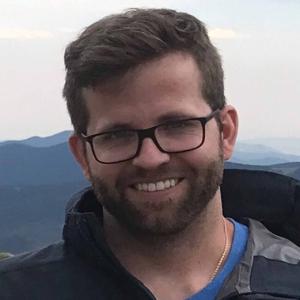
Zach Johnson
Education:
PhD in Biochemistry
Duke University '15
Advisor: Seok-Yong Lee
BS in Chemistry
University of Florida '09
Zachary currently works at Schrödinger. He previously worked at Pfizer as a Principal Scientist and at The Rockefeller University as a Postdoctoral Fellow where he did research in the laboratory of Jue Chen, studying the structure and function of ABC transporters that are involved in multi-drug resistance to chemotherapy.
Choosing Biochemistry
I had taken organic chemistry courses where I learned about harsh chemical catalysts that carry out complex organic chemical reactions. But my mind was blown during bio-organic chemistry when I learned that natural enzymes could perform the same reactions by organizing amino acid side chains into the proper spatial arrangement. That was when I fell in love with biochemistry.
Why Duke?
I was drawn to Duke’s Department of Biochemistry because of its prestige—but I chose to attend because I knew I wanted to study biochemistry. I was looking for a small department that had a single focus, unlike other universities that have large interdisciplinary programs. This decision proved fortuitous, as its small size definitely fostered a more collaborative environment —everyone knew each other—including the postdocs, professors, and staff. Now having collaborative skills has proven essential in my postdoc and will no doubt be invaluable in my career.
My Impact
As a graduate student, I published the first three-dimensional structure of a protein called a concentrative nucleoside transporter, which moves cancer drugs into cells so they can take effect and kill the cancerous cells. During my postdoc, I published the first three-dimensional structure of another transport protein called the multidrug resistance protein 1, which pumps cancer drugs out of tumor cells leading to chemotherapy resistance. I hope my combined body of work leads to a better understanding of the mechanisms of anticancer drug disposition and to better chemotherapy treatments.
My Job at Pfizer
I’m taking my membrane protein expertise developed at Duke and exploring membrane protein structure with a new technique called cryo-EM. As a graduate student I used X-ray crystallography to elucidate three-dimensional structures of membrane proteins. Now at Rockefeller, I’ve developed expertise in cryo-EM. For those lucky enough to attend Duke, it will soon have its own cryo-EM facilities, so graduate students will have the opportunity to study protein structure both by X-ray crystallography and cryo-EM.
A Bit of Advice
There are ample opportunities to do groundbreaking science, as the department’s publications speak for themselves. But I recommend enjoying your time at Duke—the people, the city of Durham, and especially the university community which I value even more as my career progresses. Duke is a special place, and I look back on my time there as some of the best years of my life.
My Network
I still keep in touch with fellow classmates, postdocs, and professors. And when I visit Durham, I always stop by the biochemistry department. I still have very close relationships with my graduate advisor and the department chair, and will continue to reach out to them for science, career, and life advice. As I near the end of my postdoc, I know the biochemistry department will be an invaluable resource for advice and connections for the next stage in my career—when I’m leading either a group in industry or academia and studying the fascinating world of membrane protein structure and function.